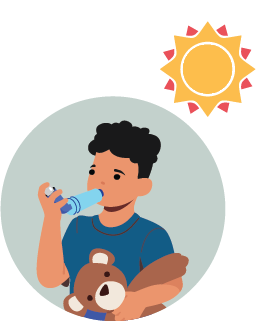Key points
- Heat can harm physical and mental health.
- Warmer temperatures can contribute to unhealthy air quality.
- Making a heat action plan with your patient can help them stay safe on hot days.

Background
Hot days can harm physical and mental health. While all people can have health harms from heat, some people may be more at risk, including:
- infants and children,
- pregnant women,
- adults over age 65,
- people with disabilities,
- people with mental health conditions,
- people with chronic health conditions,
- people with substance-use disorders,
- people who lack housing and/or quality housing,
- people who lack access to cooling,
- people who are socially isolated,
- people who breathe polluted air,
- workers, and
- those who engage in strenuous outdoor activities including athletes.
Hot days have been associated with
- worse pregnancy and birth outcomes, and
- more emergency department visits and hospitalizations for many reasons, such as for
- heat-illness, cardiovascular and respiratory diseases, asthma, diabetes, kidney diseases, mental health conditions, and injuries, including injuries at work.
- heat-illness, cardiovascular and respiratory diseases, asthma, diabetes, kidney diseases, mental health conditions, and injuries, including injuries at work.
Risk factors
Where an individual lives, works, plays, and learns can influence how much heat they get exposed to. Heat islands, where temperatures are hotter than surrounding areas, can often be found in city neighborhoods that have fewer trees and greenspace that provide cooling, and more pavement and dark surfaces that retain heat. Heat islands are common in low-wealth urban communities.
Rural communities also face health risks from heat and have been found to have higher rates of heat-related health care utilization than urban areas. In rural communities, more people may work outdoors, and cooling access may be more limited as compared to urban areas.
People who spend time outdoors on hot days, particularly those with a high level of physical exertion, are at increased risk from heat-related health outcomes. This includes farm and agricultural workers, construction workers, landscapers, military personnel, and people participating in outdoor exercise, recreation, and sports. Wearing personal protective equipment while working or playing may make people hotter.
Heat and medication
Many medications, including over the counter medications, can impair heat tolerance and the body's ability to regulate its temperature, which can predispose people to heat illness during hot days. Medications can decrease the ability to sweat, and therefore to cool, through limiting the dilation of blood vessels in the skin that can release heat or through affecting the body's ability to control its temperature. Medications, including certain antibiotics, can increase sensitivity of the skin to the sun, and direct heat can degrade or damage certain medications, such as insulin or inhalers.
Attention to heat exposure as a component of medication management may prevent harm. The Heat and Medications page provides more information on medications and heat and can guide your review of medications with your patients.
Patient management
Visit the following sections for heat and guidance.



